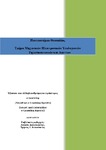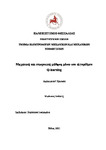A Game-Based Learning Approach in Digital Design Course to Enhance Students’ Competency
Ημερομηνία
2022Γλώσσα
en
Λέξη-κλειδί
Επιτομή
Digital Design is a laboratory course, and the educator must focus on the students’ need to know why they study the theory and mainly on the transition from knowledge-based learning to competency-based learning. This study consists of five surveys that were conducted during 2017–2021. First, we evaluated students’ learning outcomes in order to define possible learning problems. According to the literature, gamification can have a positive impact on students’ motivation and learning outcomes. Therefore, we used ready-made digital games in order to evaluate students’ satisfaction and willingness toward their integration in the educational process. This process was repeated in the next academic year. The feedback we received from the previous surveys has helped us to adapt to the new approaches of teaching due to the current pandemic caused by COVID-19. We proposed an online holistic environment based on Keller’s (1987) ARCS model and Malone’s (1981) motivational model, which was applied in distance learning. Each student participated in a student-centered learning experience. He took an active role and was self-manager of his learning process. He was given the opportunity to develop capabilities and strategies through practice and engagement in higher-order cognitive activities, acquire self-learning skills, learn how to solve problems, and participate in teamwork. This study’s innovation is that students experienced a combination of learning approaches: (a) a virtual lab consisting of simulation-based activities, which allowed students to access new laboratory experiences, (b) a project-based digital game without a processor, which developed their motivation, creativity, and hands-on ability, as opposed to the other relevant studies that use ready-made games, and (c) asynchronous videos as feedback, which ensured the educator’s emotional support and social presence. Finally, this study developed research to evaluate the effectiveness of this online holistic environment and used a questionnaire, which was created based on Keller’s Instructional Materials Motivation Survey tool. The results showed that its integration in distance learning is probable to motivate students to learn and affect positively their attention, relevance, confidence, and satisfaction. © 2022 by the authors. Licensee MDPI, Basel, Switzerland.
Collections
Related items
Showing items related by title, author, creator and subject.
-
Μηχανική και ενισχυτική μάθηση μέσω του αλγορίθμου Q-learning
Μπάτσιος, Ιωάννης (2021) -
Motivating Engineer Students in E-learning Courses with Problem Based Learning and Self-Regulated Learning on the apT2CLE4‘Research Methods’ Environment
Paraskeva F., Alexiou A., Bouta H., Mysirlaki S., Sotiropoulos D.J., Souki A.-M. (2019)More and more university programs try to establish an understanding of research methodology with relevant courses at undergraduate schools. Engineer students should have adequate academic training and experience to gain ...



